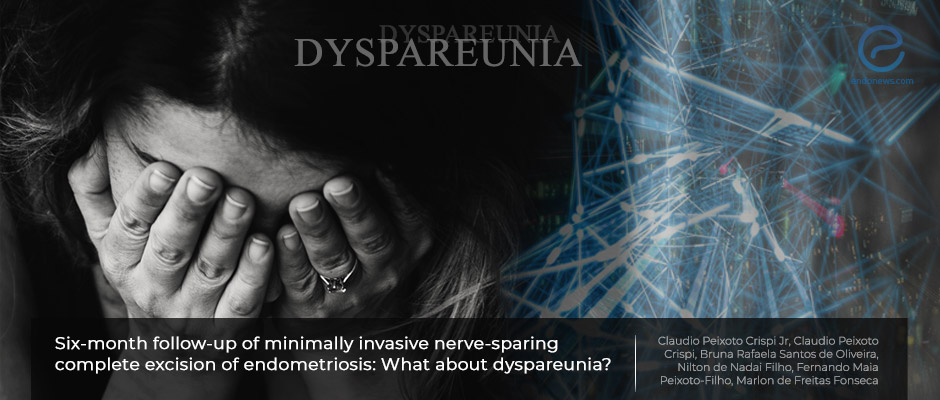A gentle touch on nerves affects dyspareunia
May 13, 2021
Effect of nerve-sparing surgery of endometriosis on dyspareunia.
Key Points
Highlights:
- The presence of endometriosis on some anatomic locations causes deep dyspareunia and laparoscopic complete removal of endometriosis with nerve-sparing technique provides significant recovery.
Importance:
- The present study aimed to clarify the effect of laparoscopic nerve-sparing endometriosis surgery, with or without robotic assistance, on dyspareunia.
What's done here:
- The data of a total 121 women who underwent laparoscopic nerve-sparing endometriosis surgery, were analyzed retrospectively.
- The presence of dysmenorrhea, its severity and acyclic menstrual pain were evaluated preoperatively and at the 6th month after the surgery with an 11-point numeric rating scale (NRS).
- Patients were divided into two groups according to NRS points, ≤ 3 (mild dyspareunia) and > 3 (moderate and severe dyspareunia).
- Groups were compared in terms of preoperative characteristics, operative parameters, and postoperative outcomes.
Key Results:
- Relationship status, education level, yearly income, smoking, alcohol use, physical activity, and BMI were similar between patients with mild dyspareunia and moderate/severe dyspareunia.
- Out of patients with moderate/severe dyspareunia, dyspareunia was improved more than 3 points in three fourth of patients, and less than 3 points in one fifth of patients. Only, 5% patients faced a worsening of the symptoms following the surgery.
- Laparoscopic nerve-sparing endometriosis surgery did not affect dyspareunia in 88% patients with none/mild dyspareunia. In contrast, de novo dyspareunia has occurred in 12% of patients following the surgery.
- Presence of mental disorder, application of bilateral uterosacral ligament resection, the absence of postoperative hormone therapy, the need for parametrial resection, application of colporrhaphy, the presence of recto-cervical and rectovaginal nodules were common in non-responder patients.
Limitations:
- The present study had a retrospective nature with a small patients’ number.
- The study discussed only the short-term results of laparoscopic nerve-sparing surgery on dyspareunia, lacking medium-term and long-term outcomes.
- The study analyzed data from a single-center without evaluating the cost of the surgery.
Lay Summary
Endometriosis is a common disorder among women. Previous studies reported endometriosis-related deterioration of the quality of life. Deep dyspareunia is a common symptom of endometriosis and young patients face dyspareunia twice as much. Surgical treatments are alternative to medical therapies in cases of no benefit.
Crispi and colleagues investigated the role of laparoscopic nerve-sparing endometriosis surgery on dyspareunia in 126 women.
Authors divided patients into two groups according to dyspareunia, ≤ 3 (none or mild dyspareunia) and > 3 (moderate or severe dyspareunia), based on NRS points. A total of 121 patients were followed up for an average of six months.
At the end of the evaluation, the authors achieved a reduction in dyspareunia in 59 of 62 patients with moderate or severe dyspareunia. In contrast, laparoscopic nerve-sparing surgery did not provide any benefit for dyspareunia in 88% patients with none or mild dyspareunia. In addition, de novo dyspareunia was formed in 12% of cases following surgery in patients with none or mild dyspareunia.
The authors concluded that even if the results showed satisfactory results in deep dyspareunia rates after nerve-sparing endometriosis surgery, the patients should be alerted that this might change according to the need for additional operative procedures or personal responsiveness.
Research Source: https://pubmed.ncbi.nlm.nih.gov/33891600/
dyspareunia nerve-sparing surgery deep infiltrative endometriosis

